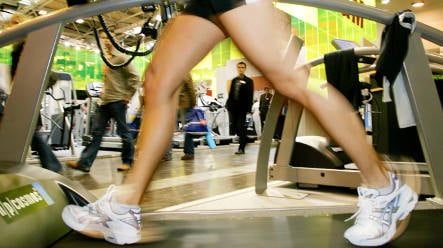The most painful things about recessions, for those of us who still have jobs, are the forced choices.
What do you hang on to, what do you discard? It is as if your life has become a giant house clear-out.
Newspaper subscriptions? Out. Listening to the radio in the bath? In.
Weekday “business lunch” with some SPD functionary? Out. Pudding pretzel at the baker in the morning? In.
Cinema? Out. DVDs? In. Steak? Out. Mincemeat? In.
Now here comes the tricky one, a call from the gym reminding me that it is time to renew my membership.
In or out? This is of course not just a recession-related question. I have been feeling like an alien in the gym for some time, as if I have strayed by mistake into an Amazonian village, but I have clung on to membership out of the usual anthropological reasons.
Why do Germans feel that it is a basic, almost constitutional human right to stretch their muscles and then march about naked in the changing rooms? They make it seem like a national duty. But of course times have changed a little: there is no such thing as responsibility to the German nation anymore, only to one’s individual well-being.
That is why, during the good years (as we now have to consider 2005-8), gym membership ballooned in Berlin and throughout Germany. As did the number of Thai, Chinese and Aryuveda massage joints. Anyone with a Wellness Centre business plan could pick up a loan. A better body was somehow linked to the potential for ever-higher earnings.
So, my instinct is to say no thanks to the gym. Human muscles are vaguely interesting but not half as interesting as human brains. In bad times – you ask any bear – it is better to accumulate fat and hibernate. The challenge of an economic crisis is not to build up your abs and pecs and your body mass (just think how much more you have to eat to sustain that) but rather to relax tense muscle.
Doctors report a rapid increase of patients with headaches and migraines that stem from scrunched up necks and shoulders, often a direct result of conversations with one’s tax adviser.
Conclusion: use the cash saved by cancelling gym membership to pay for massages, forget the collapse of capitalism for an hour and stop sweating on the treadmill.
This is not, admittedly, a perfect solution. I visited a (respectable) Thai massage parlour on Berlin’s Kantstrasse last week and found the team more interested in a YouTube report on the widespread Bangkok unrest than in my frozen shoulder. The masseuse was angry presumably because her side was losing in the revolution.
“Must be good to have a revolution where everyone wears either a red or a yellow shirt,” I said, trying to look on the bright side of things, “a bit like a football match with tanks.”
“More complicated,” said Som in her evening-school German. She pressed hard on the shoulder blade and I squawked. “You very verspannt,” she said.
But it could have been worse. I could have been on the table of Dr Dot. Her real name is Dorothy Stein but she had been called Dr Dot ever since she sorted out Frank Zappa’s back. Since then she has become the big celebrity masseuse – her clients include Sting, Mariah Carrey, Lauryn Hill and Bruce Willis – and whenever a rock group performs in Berlin they come to her for treatment.
She has a global following but of course almost nobody knows here in Berlin; the charm of the city is its sheer inability to recognise international stars unless they are spotted coming out of Borchardt’s restaurant.
Brad Pitt and Angelina Jolie thought the fact that they could walk down the street like normal people was a sign that Berliners were cool, insouciant. In fact, Berliners are simply short-sighted. As a result Dr Dot – though she writes a very energetic sex column for the excellent English-language magazine ExBerliner – lives in the city almost anonymously until one of the Rolling Stones hurts one of his ageing joints.
But massage is no more an escape from the global mess crushing the German economy than working out at Holmes Place surrounded by increasingly nervous managers grunting as they lift 10 kilo weights.
Here then is my solution: cancel your gym membership, forget the massage table, and go for a walk in Berlin’s Grunewald park. If you spot me in the forest, identify yourself and I will buy you a beer. It’s better for your health and better for the German economy.



 Please whitelist us to continue reading.
Please whitelist us to continue reading.
Member comments